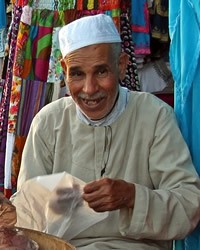Arab, Moroccan in Libya

Photo Source:
Monica Volpin - Pixabay
|
Send Joshua Project a map of this people group.
|
| People Name: | Arab, Moroccan |
| Country: | Libya |
| 10/40 Window: | Yes |
| Population: | 324,000 |
| World Population: | 31,513,800 |
| Primary Language: | Arabic, Moroccan |
| Primary Religion: | Islam |
| Christian Adherents: | 0.09 % |
| Evangelicals: | 0.01 % |
| Scripture: | New Testament |
| Ministry Resources: | Yes |
| Jesus Film: | Yes |
| Audio Recordings: | Yes |
| People Cluster: | Arab, Maghreb |
| Affinity Bloc: | Arab World |
| Progress Level: |
|
Introduction / History
The ancestors of the Moroccan Arabs originated in the Arabian Desert. From there, they gradually migrated into northern Africa. The early Islamic period was a time when "Arab identity" meant that all Arabs had descended from a common male ancestor. Thus, being an Arab brought recognition, honor, and certain privileges.
Over the centuries, the Arabs have become somewhat intermingled with Berber tribes, and this has influenced their way of life. Nevertheless, the two groups have remained distinct. The long and short of it is that the Arab population of Morocco is distinct from other Arab populations. This will affect their lives in Libya where some of them live, even though there is also Berber influence in that country.
Libya is in a state of near civil war, yet enough Moroccans have been moving there in recent years to alarm the government of Algeria, a country that is between Morocco and Libya.
Where Are they Located?
Moroccans usually stay in Morocco, but some have migrated elsewhere, including Libya, which is hundreds of miles to their east.
What Are Their Lives Like?
Moroccan Arabs in Libya try to preserve their cultural traditions such as the naming of children. It is customary for an Arab child's name to reflect the three dominant elements of Arab life: kin, home and religion. Thus, a boy might have a name such as "Muhammad ibn Ibrahim al Hamza." "Muhammad" represents his religious name. "Ibn Ibrahim" is his father's name. "Al Hamza" means that he is from the village of Hamza. Girls are given similar names, which they keep even after marriage. This reflects the Muslim Arab tradition that even though women are subservient to men, they retain their identities, separate legal rights and family ties.
What Are Their Beliefs?
Moroccan Arabs in Libya are Sunni Muslim, though there are pre-Islamic beliefs mixed in. In theory, Muslims are completely depended on Allah, but in practice, most look to other spirit beings as well.
What Are Their Needs?
Moroccans in Libya need to be safe from the violence that is plaguing that country.
Prayer Points
Ask the Lord to call people who are willing to reach out and share the love of Christ with Moroccans in Libya.
Ask God to strengthen, encourage, and protect the small number of Moroccan Arabs who have decided to follow Christ.
Ask the Holy Spirit to soften the hearts of Moroccan Arabs towards Christ followers so that they will be receptive to Jesus Christ.
Ask the Lord to raise up strong fellowships of believers and Disciple-Making movements among Moroccan Arabs in Libya.